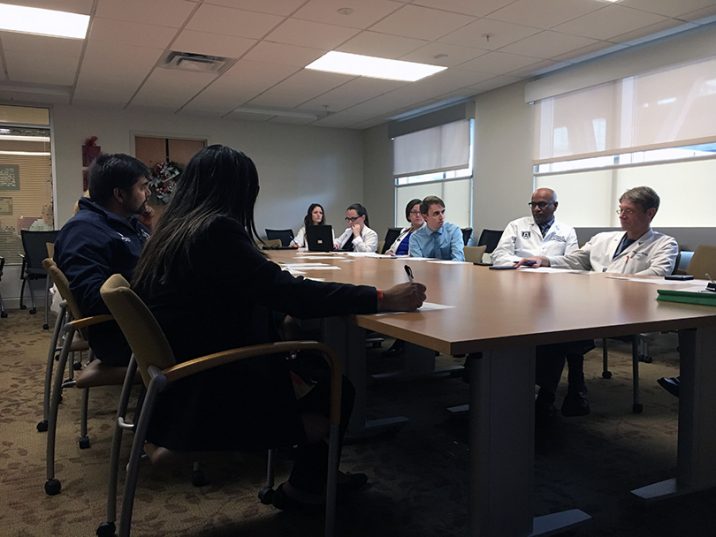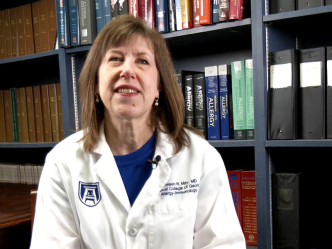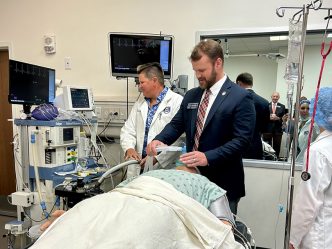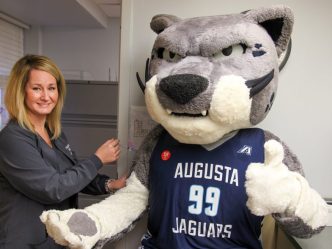When it comes to providing the best care for our patients, staff at the Georgia Cancer Center are focused on putting the patient and their family at the center of the treatment plan. One way to make sure that happens is through a team-based approach bringing together medical oncologists, radiation oncologists and other specialists for each tumor type. For lung cancer patients, there are new team members ready whose sole mission is to provide hope and a future.
“We are all dedicated and passionate about treating lung cancer patients and helping them defeat their disease,” said Dr. Shaheen Islam, Director of Interventional Pulmonology and Pulmonary Oncology at the Georgia Cancer Center and Medical College of Georgia at Augusta University. “When you have a team approach, you have a continuity of care. We are able to share information with the other team members about the strategy and treatments a patient is receiving for their form of lung cancer.”
A patient’s journey through the lung cancer program usually begins in radiology, where an x-ray or computerized tomography scan shows some sort of growth inside the lung. The next step typically is for Islam, who came to Augusta University Health and the Georgia Cancer Center in July, to do a biopsy removing a piece of that growth. Once the biopsy is complete, the tissue goes to the pathology department to see if the growth is cancerous.
“Nobody likes hearing they have cancer,” Islam said. “I want them to know they have cancer and we have a plan to treat it. Yes, you have cancer, but this is not the end of your life.”
After receiving the diagnosis, a patient’s next stop is usually to meet with a medical oncologist who specializes in their tumor type. For lung cancer patients, their expert is Dr. Nagla Abdel Karim. Karim, who started in September, came to Augusta from Ohio. While she says she loves to solve the challenges presented by a lung cancer diagnosis, she believes strongly in educating patients, their caregivers and others about lung cancer, screening options, prevention and treatment plans.
“While we are doctors, we are also educators,” Karim said. “Hopefully, our messages motivate people to take an active role in their health. Whether it’s scheduling a lung screening or sitting down with a family member or friend, I am passionate about offering learning seminars.”
While Karim handles the chemotherapy piece of treating cancer, she works with Dr. Carsten Schroeder to determine whether a patient is able to have surgery to remove their tumor. If radiation is required, that’s where the third newest member of the lung cancer team comes in.
“My desire to work in oncology came from having a lot of people in my family suffer through various types of cancer,” said Dr. Stephen Ramey, thoracic radiation oncologist at the Georgia Cancer Center. “I grew up watching the impact their doctors, nurses, and other support staff could have on the lives of my loved ones. There were a source of comfort and understanding throughout the treatment process.”
Sometimes, the standard of care is not the answer to a patient’s cancer. That is why Karim and the team are working to open various clinical trials. Those trials include new treatment options, in addition to the standard of care chemotherapy. Two Phase I clinical trials will soon open at the cancer center to add either a drug called bosutinib or a drug called cabozantinibat at different doses, in addition to the standard of care pemetrexed (alimta). These two clinical trials aim to find suitable doses of the bosutinib or cabozantanib when given in combination with chemotherapy and, while doing so, they have the potential to benefit patients with advanced lung cancers, especially if they don’t have better treatment options. Karim is also working on finding novel treatment options for advanced solid tumors, lung cancers and, specifically, small cell lung cancer as a part of her efforts on the national level with several other cancer centers.
When it comes to patient- and family-centered-care, offering a team approach brings in different perspectives and ideas about the best way to treat each cancer patient. A team approach may not be needed for every patient, but it can be tremendously beneficial in challenging cases or situations where the patient is not getting better.
“The idea is to save the patient from multiple visits to different specialists,” Karim said. “It is a more effective use of our time, so we can save the patient the time it takes to come back to the cancer center week after week.”
“For a long time, there weren’t a lot of hopeful options for lung cancer patients,” Ramey said. “Now, we’re starting to see advances and growth in the field offering better treatments helping patients live longer with a better quality of life.”
“With lung cancer, we can’t wait,” Islam said. “I am here to take care of the patient by offering the very best care I can. It makes me feel proud knowing I made an impact.”
 Augusta University
Augusta University





